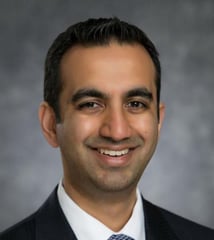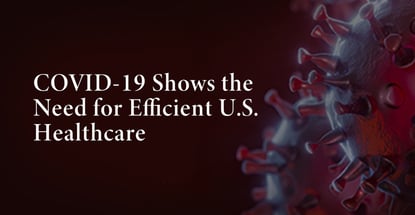In a Nutshell: The COVID-19 pandemic has made life challenging in many ways, but it has also shined a light on some positive transformations in the U.S. healthcare system. If those changes are preserved long term, they will result in efficiency gains, according to Dr. Amol Navathe, clinician and researcher at the Penn Leonard Davis Institute for Health Economics (Penn LDI). Dr. Navathe contends that realigning healthcare delivery and utilization with public health and addressing the system’s inherent inequalities could not just improve overall health but also boost the economy.
The COVID-19 pandemic continues to affect the health of Americans and the economy of the healthcare industry.
That’s why research teams at the University of Pennsylvania Leonard Davis Institute for Health Economics (Penn LDI) are looking at the pandemic from an economic perspective to understand what’s working in the U.S. healthcare response and what isn’t.
Penn LDI researchers say they see a reason for optimism as U.S. healthcare providers streamline their processes in response to COVID-19. If providers can preserve these changes post-COVID-19, the system promises better outcomes for all.

Dr. Amol Navathe is a Senior Fellow at Penn LDI.
Health economists argue that COVID-19 has exposed the system’s structural flaws and inequities, and has pointed the way toward a revised public health strategy that could also contribute to growing the U.S. economy.
That win-win for healthcare and the economy won’t be easy to achieve without a widespread public understanding of the connection between health care and economic success, according to Dr. Amol Navathe.
Dr. Navathe brings to his role as Senior Fellow at Penn LDI experience from the private sector and policymaking during both the George W. Bush and Obama administrations.
“Millions of Americans are being touched by COVID-19 in negative ways,” Dr. Navathe said. “But, at the same time, the pandemic is transforming our healthcare system. I’m interested in understanding what’s happening and why.”
Preserving Telehealth is Critical to Public Wellness
Dr. Navathe said he has observed a critical shift toward remote healthcare access — telehealth — that is rapidly transforming how patients interact with caregivers.
“This is fascinating because we’ve had the technology to do telemedicine for a decade or more,” Dr. Navathe said. “Insurance companies and others have tried to get clinicians to adopt it, with very little success.”
That shift is now motivated by lost patient volume. Patients and providers are understandably more cautious about seeing each other in person during a global pandemic.
“Our system has traditionally been structured around in-person visits. I go to a doctor, and the doctor bills me, and they get paid,” Dr. Navathe said. “So it’s been a very transactional system, not based on keeping the public, as a whole, healthy, but on these transactions.”

Penn LDI works with researchers on a variety of topics related to COVID-19.
Payers are now evolving to address the new normal as downturns in patient visits bring fiscal challenges to small hospitals and practices.
“Medicare has adopted so-called payment parity, which means that an in-person visit and a telehealth visit are paid the same,” Dr. Navathe said. “So, I think we’re seeing some good progress along those dimensions.”
Dr. Navathe regards the shift to remote care as one of COVID-19’s silver linings.
“It’s time-consuming to see a physician. If you can take your blood pressure at home, you don’t even need that visit,” he said. “We can get a lot more health for each input dollar we put into the system.”
Decoupling Employment From Insurance Can Keep Societies Healthier
COVID-19’s impact on healthcare financing intersects more fundamentally with the economy. At the same time, states are receiving less tax revenue due to job loss and economic downturns, newly unemployed people find themselves losing their employer-sponsored health coverage at the worst time.
“States are finding themselves in a fiscally constrained position of figuring out how to protect people when their budgets are getting smaller, not bigger,” Dr. Navathe said. “It seems like the exact opposite of what we want would be to have 10, 15, or 20 million people suddenly become uninsured amid a pandemic.”

Given that other advanced nations have found the consensus to offer healthcare access to individuals even when they don’t have employment, the opportunity is there for the U.S. as well, Dr. Navathe said.
He said that Americans have no problem supporting public education because it helps every individual become more economically productive, which serves to raise income levels and the standard of living for everyone.
“But we don’t have nationalized healthcare, and I think why some folks have argued against it is by claiming that healthcare doesn’t have those attributes. If you don’t have healthcare, how does that affect me? I think the pandemic has pointed out that maybe that’s not quite right.”
On one level, sick individuals risk making others sick. And on another, the inability to participate in the economy due to health concerns carries the same public consequences as inability due to lack of education.
“People losing health insurance exacerbates the dismal reality of the economic spiral that accompanies the pandemic,” Dr. Navathe said. “I think it just makes sense for people that that doesn’t feel right.”
Penn’s Leonard Davis Institute: Exploring the Economic Implications of Healthcare Policy
Dr. Navathe and co-author Ezekiel J. Emanuel present these and other arguments in articles recently published in The New York Times. In “Will 2020 Be the Year That Medicine Was Saved?,” Dr. Navathe and Emanuel submit that the telemedicine shift, the beneficial changes in hospitalization thresholds, and the use of affordable medications and interventions will wither post-COVID-19 without congressional support.
In another article titled “How Health Insurers Can Be Heroes. Really,” they call on the health insurance industry to pour short-term profits gained from COVID-19-induced lower utilization back into cuts in premiums and copayments, assistance for small hospitals and private practices, and support for public health and research initiatives.
That would allow public and private health stakeholders to work together to mitigate some of the detrimental economic effects the pandemic is imposing on those least able to endure it.
Others at Penn LDI support Dr. Navathe’s work, with one group studying the health effects of economic downturns and how they feed off each other. Another group probed how technology for remote screening can reduce disease transmission.
The research teams at Penn LDI look for ways to optimize insurance access and improve care, especially for older adults and other vulnerable populations.
Dr. Navathe said those inequities, inherent in the U.S. economy and healthcare system, exacerbate the pandemic’s effects.
“In my work, I’m calling for fundamental change in how we pay for care to be more mindful of these disparities,” he said. “Medicare and the health insurance companies should take on these issues directly and look for more ways to encourage the positive trends COVID-19 has brought out.”
Advertiser Disclosure
CardRates.com is a free online resource that offers valuable content and comparison services to users. To keep this resource 100% free, we receive compensation for referrals for many of the offers listed on the site. Along with key review factors, this compensation may impact how and where products appear across CardRates.com (including, for example, the order in which they appear). CardRates.com does not include the entire universe of available offers. Editorial opinions expressed on the site are strictly our own and are not provided, endorsed, or approved by advertisers.





![How Do Credit Cards Work? Expert’s Guide ([updated_month_year]) How Do Credit Cards Work? Expert’s Guide ([updated_month_year])](https://www.cardrates.com/images/uploads/2017/04/how-do-credit-cards-work.jpg?width=158&height=120&fit=crop)
![9 Best Airline Rewards Programs: Expert Guide ([updated_month_year]) 9 Best Airline Rewards Programs: Expert Guide ([updated_month_year])](https://www.cardrates.com/images/uploads/2017/10/airline.png?width=158&height=120&fit=crop)
![How to Sign Up For a Credit Card: Expert Guide ([updated_month_year]) How to Sign Up For a Credit Card: Expert Guide ([updated_month_year])](https://www.cardrates.com/images/uploads/2017/12/signup2.png?width=158&height=120&fit=crop)
![What Credit Card is Best for Me? Expert Guide ([updated_month_year]) What Credit Card is Best for Me? Expert Guide ([updated_month_year])](https://www.cardrates.com/images/uploads/2018/03/me.png?width=158&height=120&fit=crop)
![9 Expert Solutions: Build Credit Without a Credit Card ([updated_month_year]) 9 Expert Solutions: Build Credit Without a Credit Card ([updated_month_year])](https://www.cardrates.com/images/uploads/2018/05/without2.png?width=158&height=120&fit=crop)